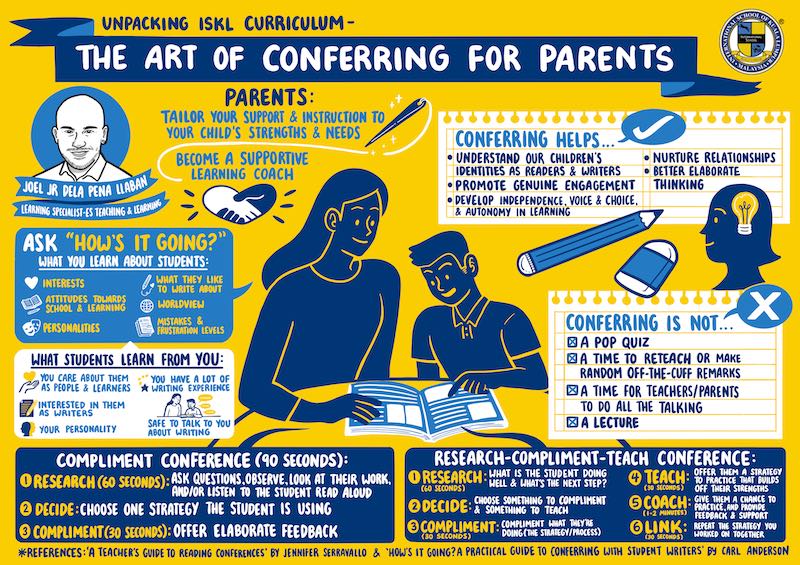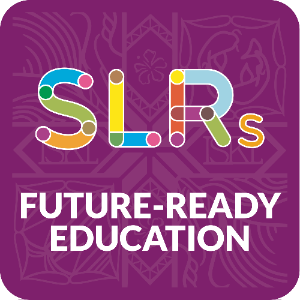
As parents learn the way to Navigate Online Learning Through Their Roles as Learning Coaches, conferring is a useful way to encourage and develop their child’s unique identity as a reader and writer. While it is important to provide feedback during your child’s continuous learning, a common question that parents may have is how to be a supportive learning coach without judgement so that your child is still engaged with the learning process?
How might we be able to support your children’s learning journey through conferring? In Mr. Joel Jr. Llaban’s recent workshop, “Conferring: Supporting Learners at Home”, the ISKL’s Elementary Teaching and Learning as Learning Specialist/Instructional Coach provided six simple steps to see if conferring is done correctly:
-
Conferences are a conversation
It is important to define the purpose of having this conversation. The goal during conferring is to nurture strengths, build capacity, and support your child in becoming better readers and writers. Conferring is invitational as opposed to a judgemental or evaluative type of conversation. With this in mind, it is best to ask intentional questions to help children uncover their thinking. The questions we ask our children must be grounded on specific thinking moves, such as noticing details, understanding diverse perspectives, or uncovering complexities. -
Conferring is intentional
Your role is not as subject matter expert, but rather a curious inquirer of your child’s thinking, intentionally navigating the complexities of their thinking. We ask children the thought provoking questions or process-oriented questions to enable ownership and craftsmanship. A few examples include, “What are you doing as readers and writers today?”“Help me understand the struggles the characters are experiencing?” “What details have you developed to illustrate the character’s challenges?” -
Conferring provides agency
The goal when we confer with children at home must not come from a place of compliance and control. Rather, to give children the agency their own personal pathways for learning by building that genuine and generative engagement through your invitational, guiding questions so that children become independent and agentic in their own practice, which are cornerstones in developing future leaders.This also requires a gradual release of responsibility as adults pursue our children’s lines of thinking. We support them in ways to independently identify their areas of challenges and celebrate their areas of competence and strengths; as well as ways to carve actions to achieve their learning goals. Prompts such as, “What skills and dispositions for learning that might have supported you in writing?” “Which of the failures and challenges will you consider in your next iteration of the design cycle?” “Given the success you have in your current writing, as an author, where would you like to take your writing next?” are grounded on student’s ability to self-direct their own learning.
-
Conferring shows we care
One significant takeaway on conferring is that listening is key when it comes to conferring. In Carl Anderson’s “How’s It Going: A Practical Guide to Conferring with Student Writers”, the beauty in conferring isn’t just about what you learn about your children, but also what they learn about us, making this an invaluable reciprocal experience for both parents and children. From a parent perspective, you learn about their interests by listening and following their lines of thinking.As children, it’s important that for them to know that you care about them as people and learners. Conferring provides them a safe environment to talk to you about their writing and reading process. For example, “Mom, I’m having difficulty understanding how I can use this particular word in this context,” or “I’m having difficulty creating an illustration for my story.” With conferring, there’s a sense of safety the moment they are able to open up to you about their frustration level, which you can then begin to talk to them about.
-
Conferring allows us to assume the role of a learning coach
A learning coach is an active and empathetic listener, who not only encourages deep engagement for learning, but also empowers and enables a child to learn through the questions, guidance, support. Due to the sense of urgency and structures of online learning, we may tend to be transactional in the way we require learning for our children, conferring really is more of a transformational approach to learning because the questions we ask have sustainable and lasting value. They are grounded on purpose, process, and learning dispositions. -
Conferences have predictable structures
There is a structure to the conversation because conferring is purpose-driven. There is a clear intention to the questions we offer to children to support them in making intentional decisions about the next steps in their reading or writing. The questions we offer in this conversation enable them to look back and reflect in order to support their next lines of thinking.
How To Confer Effectively
The beauty of conferencing is that it doesn’t have to take up a lot of time. Remember, conferring is not the time to reteach, start a pop quiz, or for parents to do all the talking. Consider the following as a guide:
Step 1: Research (60 seconds)
-
Ask questions, observe, look at student work, and/or listen to the student read aloud.
-
E.g. ”“Show me some of the books that you’ve picked this week?” “What interested you about that book?”, “What interests you about fiction?”, “Where do you like to read?”, or “What do you think about the book so far?”
Step 2: Decide
-
“What strategy are you using that fits the purpose or the message you are conveying?” Using a building-on-strengths mindset, notice what students are already doing, and decide what you will teach them to do next.
Step 3: Compliment (30 seconds)
-
Offer the student elaborated feedback on what they did, why that’s helpful, and perhaps an example.
-
E.g. “I’m noticing that you modify your pacing so that it matches the genre and what you need to do as a reader. Like you, I find that when I read non-fiction, I slow down. Not because there’s more words but because there’s more information on each page. And it’s good that you’re noticing that and slowing down because that’s an important thing to do.”
Finally, it is important to show appreciation to your child for opening up and connecting with you. “Thank you for talking with me,” is a great way to encourage our young readers and writers to share with us a glimpse into their curious, creative, and unique minds.
When in doubt, remember that our role is simply to set the pavement; it is the child’s job to drive on it.
For more support on Parent Learning, contact us through the ISKL Community Portal.



About Joel Jr Llaban
Joel Jr Llaban is a Elementary School Learning Specialist (Teaching and Learning) at The International School of Kuala Lumpur (ISKL) supporting students, teachers and parents. Prior to ISKL, Joel worked in international schools in Brussels, Beijing and Cebu. He holds a Masters degree in International Education Administration and a Certificate of International School Leadership from the Principals Training Center. Joel also serves as part of teams evaluating and accrediting schools for CIS and NEASC. Joel is passionate about innovation, inclusion, inquiry. He thinks it’s the kind, committed, and caring people at ISKL that makes this school truly special. Follow him on Twitter at @JoelJrLLABAN

